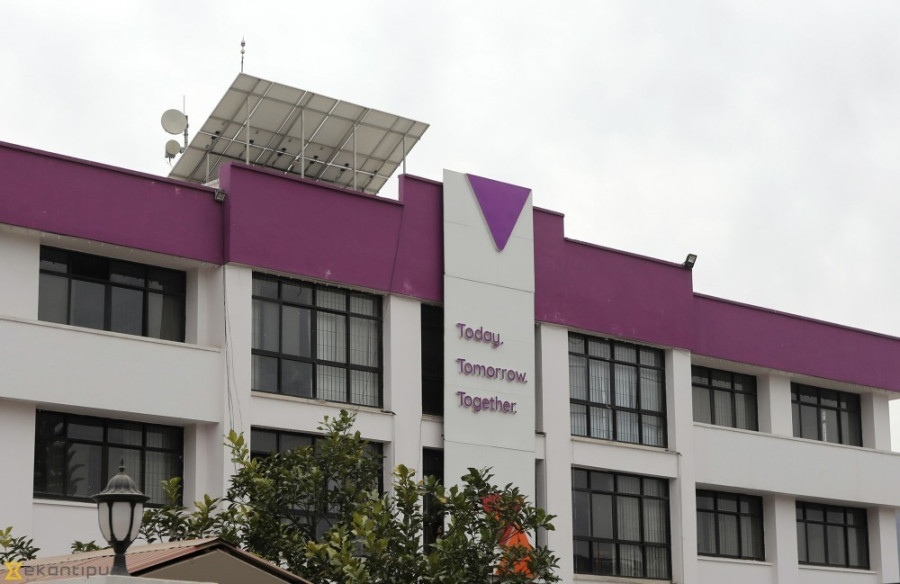National
Supreme court gives respite to Ncell in capital gains tax case
Supreme Court says the mobile company’s tax liability does not stand at Rs39 billion.
Prithvi Man Shrestha
The Supreme Court on Monday scrapped the tax determined by the Large Taxpayers’ Office for Ncell, a private sector telecom company, questioning the tax authority’s tax determination process.
The Large Taxpayers’ Office had on April 16 said it had determined the combined tax liability of Ncell and its parent company, Axiata, at Rs62.63 billion, including interest and fees based on Sections 117 (1) A, 117 (1) C, 118, 119 and 120 (A) of the Income Tax Act.
Stating that Ncell had earlier paid Rs23.57 billion in capital gains tax, the tax office had ordered the private sector telecom giant to pay the remaining Rs39.06 billion within one week starting April 16.
But Ncell filed a writ at the Supreme Court on April 22, just a day ahead of the expiry of the deadline to pay the dues, saying that the tax authorities had wrongly determined their dues. It also said that its capital gains tax liability stood at Rs14.36 billion, and not Rs39.06 billion, from a three-year-old Ncell buyout deal, as it had already paid Rs23.57 billion.
On Monday, Justices Tej Bahadur KC, Purusottam Bhandarik, Dambar Bahadur Shahi, Susmalata Mathema and Manoj Kumar Karna scrapped the tax liability determined by Large Taxpayers’ Office, stating that additional fees imposed as per Section 120 (A) of the Income Tax Act should not be part of total tax liability of Ncell.
As per this section of the law, the taxpayer is liable for a penalty as high as 50 percent of underpayment of tax where the statement in question is found to be false or misleading.
The court is of the view that penalty cannot be determined as per this section of the law because Ncell, along with its parent company Axiata, knew about its tax liability after the Supreme Court ruled on February 6 that they are liable to pay tax after Ncell’s former owner, Teliasonera, exited Nepal without paying the capital gains tax.
But the court has scrapped other claims of the petitioner, opening the door for the tax office to levy other interest and fees.
“The court appears to have chosen a middle ground in the latest order,” a corporate lawyer, who did not wish to be identified, told the Post.
A legal expert lobbying for the mobile company, who also requested anonymity, told the Post that the court has accepted that there was something wrong in the tax liability determined by the tax office, a claim Ncell has been making all along.
Those who lobbied strongly against Ncell over its capital gains tax said the court has decided in favour of a company that was never willing to fulfil its tax obligations.
Surendra Bhandari, a lawyer and a campaigner against Ncell’s alleged effort to evade capital gains tax, told the Post that the court order goes against the spirit of its own February 6 judgment.
“The Supreme Court on February 6 clearly stated that tax liability for Ncell and Axiata began since April 11, 2016, when the Ncell buyout deal took place,” said Bhandari said. “But the latest observation that Ncell didn’t know about its tax liability until February 6 and that it should not be fined as per Section 120 (A) of the Income Tax Act is contradictory.”
After a group of activists filed a writ petition at the Supreme Court demanding that it order Ncell to pay the tax, the court said Ncell and Axiata were liable to pay the tax.
On the other hand, Ncell and Axiata UK, the Malaysian company’s UK arm, which invested in Nepal, in April this year, moved the Arbitration with the International Centre for the Settlement of Investment Disputes (ICSID),
a body under the World Bank, claiming that Nepal’s conduct in relation to capital gains tax imposed on the mobile company is against the Bilateral Investment Treaty between Nepal and the United Kingdom.
The Bilateral Investment Treaty between Nepal and the United Kingdom and Northern Ireland has made the provision of referring the dispute on investment to the ICSID. But the Malaysian company wholly owns the Axiata UK while it has an 80 percent stake in Ncell indirectly.
This is the first-ever case Nepal faces in the ICSID which was founded in 1966 based on a multilateral treaty formulated by the executive directors of the World Bank to further its objective of promoting international investment. The ICSID Convention came into force for Nepal in 1969.




 18.12°C Kathmandu
18.12°C Kathmandu















